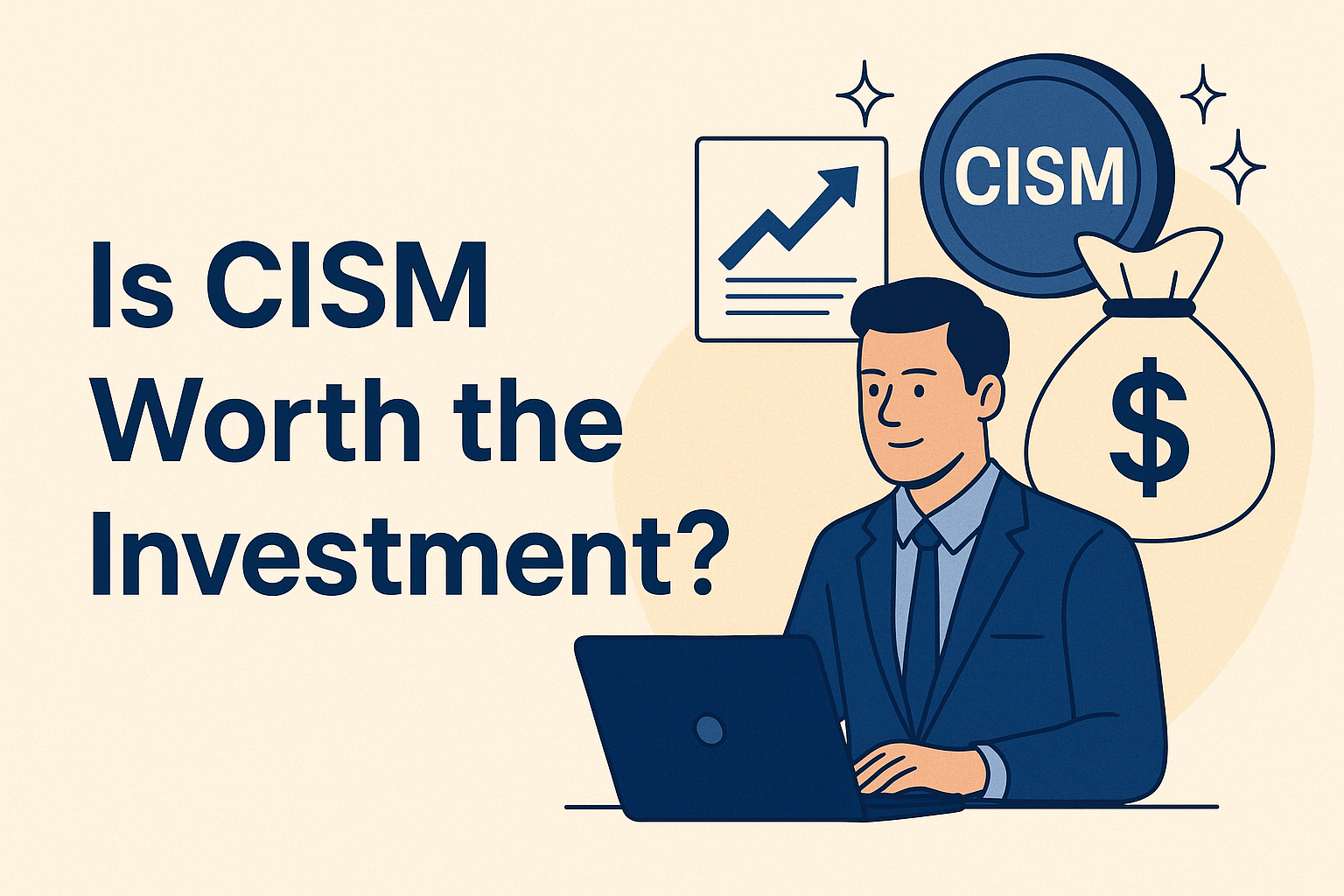
Is CISM Certification Worth It? ROI, Salary, and Career Growth
What is CISM Certification and Why It Matters in Cybersecurity?

The Certified Information Security Manager (CISM) certification by ISACA is globally recognized for validating expertise in information security governance, risk management, and program development. Unlike purely technical certifications, CISM exam domains focuses on aligning cybersecurity strategy with business goals, making it a go-to credential for professionals aiming for leadership roles.
CISM holders are trusted to build robust security frameworks, manage incident response, and ensure compliance with industry regulations. With growing cyber threats and increasing regulatory demands, organizations actively seek professionals who can bridge the gap between technical security measures and business priorities.
Key highlights of CISM certification:
- Governance-focused: Centers on managing enterprise information security programs.
- Management-oriented: Ideal for professionals transitioning from technical to leadership roles.
- Globally acknowledged: Recognized by top enterprises and government agencies worldwide.
The Global Demand for Cybersecurity Leaders with CISM
According to Cybersecurity Ventures, global cybercrime costs are projected to reach $10.5 trillion annually by 2025. This surge drives the demand for strategic leaders who can develop policies, manage risks, and align IT security with business objectives.
- Growing job opportunities: Roles like IT Security Manager, Risk Consultant, and Information Security Director often list CISM as a preferred credential.
- Employer preference: Enterprises value CISM-certified professionals for their ability to lead teams and oversee compliance initiatives.
- Leadership advantage: CISM sets you apart from purely technical specialists, giving you an edge for executive and managerial roles.
How Much Does a CISM Certification Cost? Breaking Down Expenses
The total cost of earning a CISM certification typically ranges from $760 to $1,000, depending on whether you're an ISACA member. Here’s the breakdown:
- Exam Registration: $575 (members) or $760 (non-members)
- ISACA Membership (optional): $135–$195 annually
- Study Materials: $200–$500 (official review manuals, practice tests, and training courses)
- Recertification: $45–$85 annually for Continuing Professional Education (CPE) credits
While the upfront investment may seem significant, it often pays off within months due to higher salary opportunities and better career prospects.
CISM Salary Potential: What Can You Earn After Certification
Earning a CISM certification can dramatically increase your earning potential. Industry surveys show:
- Average global salary: $120,000–$150,000 annually
- Senior roles: IT Security Managers and CISOs often exceed $180,000+
- Regional impact: Salaries vary by location, with the U.S., Canada, and Europe offering the highest pay for certified professionals.
This certification is not just about a pay raise—it positions you for strategic leadership roles where decision-making impacts organizational success.
ROI of CISM: How Quickly Can You Recover Your Investment
With salary hikes ranging from 15% to 40% after certification, many professionals recover their investment within 6 to 12 months. The ROI is particularly strong for mid-career professionals transitioning into managerial roles.
Consider this example:
- Certification cost: ~$1,000
- Salary increase: $15,000–$30,000 annually
- Break-even time: Less than a year in most cases
Comparing CISM vs CISSP: Which One Should You Choose
Both CISM and CISSP are prestigious, but they cater to different audiences:

If you aim for technical expertise, CISSP may be better. If you seek leadership positions, CISM is the way forward.
Key Skills You Gain from Earning CISM Certification
The CISM curriculum equips you with skills in:
- Information security governance
- Risk management and compliance
- Security program development and management
- Incident response planning
These competencies make you a trusted decision-maker for enterprise security strategy.
Real-World Career Growth After CISM Certification
CISM-certified professionals frequently transition into high-impact roles:
- Information Security Manager
- IT Governance Specialist
- Risk Management Director
- Chief Information Security Officer (CISO)
This certification not only improves your job prospects but also enhances your credibility with senior leadership teams.
Who Should Consider CISM Certification
CISM is ideal for:
- Mid-level IT professionals moving into leadership
- Security consultants who advise enterprises
- IT auditors focusing on governance and compliance
- Project managers overseeing security initiatives
If you aspire to lead security programs rather than configure firewalls, this credential is for you.
Preparation Timeline: How Long Does It Take to Pass CISM
Most candidates require 3–6 months of consistent study:
- Beginner candidates: ~6 months with structured learning
- Experienced professionals: ~3 months with focused review
A study plan of 10–12 hours per week is typically enough to cover all four CISM domains.
Best Resources and Practice Tests to Ace CISM
Reliable preparation tools include:
- ISACA CISM Review Manual
- CISM Review Questions, Answers & Explanations Database
- Online practice tests from Edusum and other platforms
- Instructor-led or bootcamp training
- Using a mix of study guides and practice exams helps you identify weak areas and build confidence.
7 Proven Strategies to Pass CISM Exam on the First Attempt
- Understand the exam domains thoroughly
- Use practice questions to reinforce knowledge
- Follow a structured study plan
- Focus on governance and risk concepts
- Join ISACA communities for peer support
- Take mock exams under timed conditions
- Review and revise consistently before the test date
Common Myths About CISM Certification Debunked
- “CISM is only for auditors.” False—it’s valuable for managers and security leaders.
- “You need 10+ years of experience.” Not true—5 years is sufficient.
- “It’s too expensive.” The salary boost offsets the cost quickly.
- “CISM guarantees a job.” It enhances your profile, but you still need relevant experience.
FAQs
1. Is CISM harder than CISSP?
- Not necessarily—CISM is management-focused, while CISSP is broader and technical. Difficulty depends on your background.
2. Does CISM guarantee a job?
- No certification guarantees a job, but CISM significantly improves your chances.
3. How many years of experience do you need for CISM?
- At least 5 years of work experience in information security management.
4. Is CISM worth it without experience?
- Yes, you can pass the exam first and submit experience later. However, its real value shines with relevant work experience.
5. What is the pass rate for CISM?
- ISACA does not publish official pass rates, but industry estimates suggest ~50–60%.
6. Can I self-study for CISM?
- Yes, many professionals succeed with self-study using review manuals, online courses, and practice tests.
Final Verdict: Is CISM Certification Worth Your Time and Money?
The CISM certification is absolutely worth it for IT professionals aiming for management and leadership roles in cybersecurity. With strong ROI, higher salary potential, and global recognition, it equips you with the skills to lead security programs effectively.
By aligning security strategy with business objectives, CISM helps you become an indispensable asset in today’s threat landscape.

